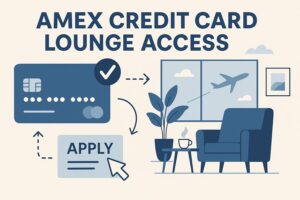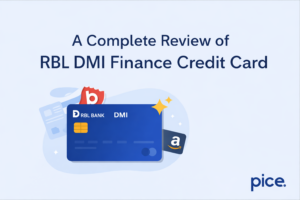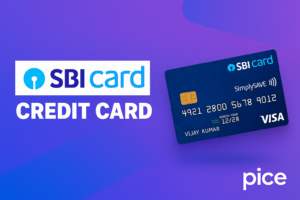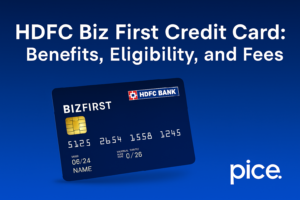What is a Credit Card Debt Consolidation Loan: Everything You Should Know
- 27 Oct 25
- 12 mins
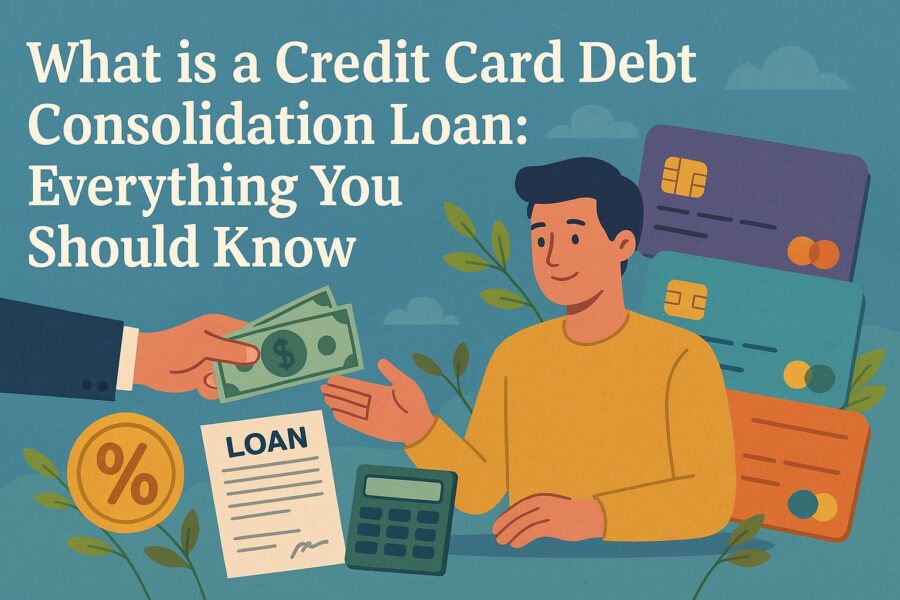
What is a Credit Card Debt Consolidation Loan: Everything You Should Know
- Important Things to Know About Credit Card Debt Consolidation
- Benefits of a Debt Consolidation Loan
- How to Apply for a Credit Card Debt Consolidation Loan?
- Factors Determining the Interest Rate on a Debt Consolidation Loan
- Things To Consider Before Going for a Credit Card Debt Consolidation
- Other Possible Option Beyond Debt Consolidation Loans
- Debt Consolidation vs Debt Settlement
- Conclusion
Key Takeaways
- Understanding what is a credit card debt consolidation loan helps you merge multiple credit card debts into a single manageable loan, simplifying your monthly payments and reducing stress.
- By opting for a credit card debt consolidation loan, you can reduce your average interest rate from around 40% p.a. (credit cards) to about 10–15% p.a. (personal loans), helping you save a significant amount of money.
- Although your credit score might drop by 3–5 points initially, making timely EMI payments for 6 months can boost your score substantially, often above 700 points.
- Debt consolidation can be achieved through personal loans, home equity loans, or balance transfer credit cards. Compare interest rates, fees, and repayment terms before choosing your method.
- Before deciding on what is a credit card debt consolidation loan for your situation, explore other options such as debt management plans, credit card refinancing, or debt settlement, depending on your repayment capacity.
Managing multiple credit card bills with different due dates can quickly become stressful. This is where understanding what is a credit card debt consolidation loan can make a difference. It means converting several small credit card loans or overdue balances into one bigger loan, making repayment far easier.
With consolidation, you not only streamline your bills but also enjoy a lower interest rate, sometimes around 11% less than what you were paying. This single-loan approach offers a smoother payment process and fewer bills to manage. Continue reading to discover its steps, benefits, and available alternatives.
Important Things to Know About Credit Card Debt Consolidation
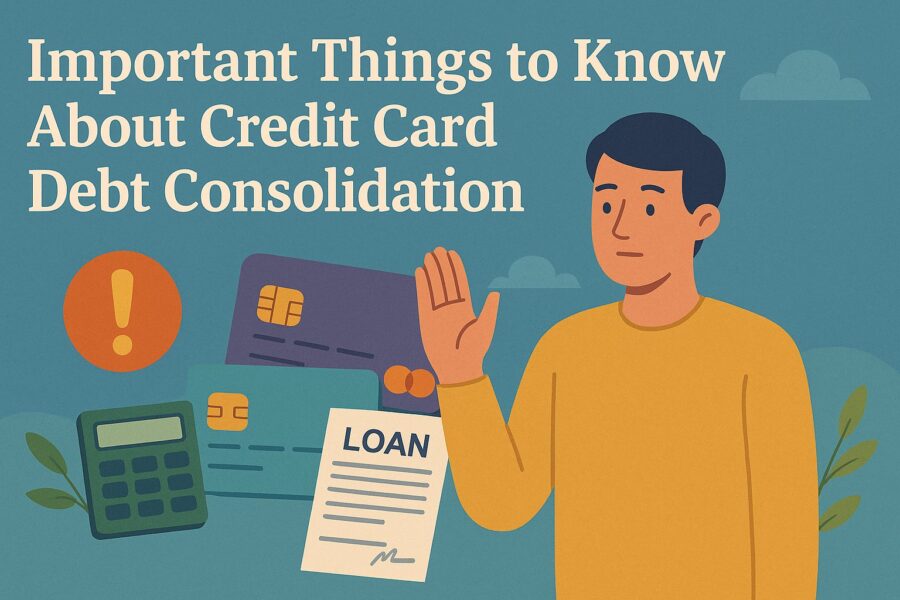
- Credit card debt consolidation is the process in which you apply for a personal loan or other credit options to pay off your multiple credit card debts to secure a lower interest rate, reduce EMIs and organise financial management.
- You can consolidate your multiple credit card debts through various methods, including a personal loan, home equity loan and balance transfer to a new credit card.
- The average rate of interest for a personal loan is 10% pa to 15% pa in India, whereas the interest rate for a credit card overdue amount is approximately 40% p.a.
- Initially, the credit card debt consolidation process can reduce your credit score by 3-5 points. However, timely paying your EMIs for the next 6 months will significantly increase your credit score.
- Do not apply for credit or loans after 6 months of credit card loan consolidation. Every inquiry about your debts can reduce your credit score by 3-5 points.
- A credit score above 700 points stimulates a steep drop in interest rates on personal loans. You can use it to save money on interest.
- Getting a credit card debt consolidation loan combines all your credit card debts into one, and makes you pay a single large EMI. Not being able to pay can prove to be an uneconomical decision and reduce your credit score.
Benefits of a Debt Consolidation Loan
- Reduces Interest Rates
On average, the interest rate on credit card debt is approximately 40% pa, whereas the personal loan interest rate is around 12.5% pa. This makes personal loans a viable method for credit card debt consolidation to reduce interest payments.
- Reduces Monthly Financial Burden
When your interest-free credit period ends on a credit card, you have to face repercussions like high interest rates and late payment fees. You have to pay your remaining dues as soon as possible to get out of this trap. Whereas, personal loans offer you low and calculated EMI payments with low interest rates if you choose to consolidate your credit card debts.
- Streamlines Financial Management
Different credit with different due amounts and different due dates with excessive interest rates can be too much to handle at once. Consolidating all your debts into a single loan amount with fixed EMIs and low interest makes it easy for you to keep track of your debts and pay them off at a steady pace.
- Improves Credit Score
Regularly paying off debts on your consolidated personal loan will eventually increase your credit score within 6 months. However, simultaneous failure to pay credit card debt within the interest-free period can potentially decrease your credit score over time. Remember, having a credit score above 700 will sharply reduce your interest rates.
- Saves Money
Paying late fees and high interest on crossing credit card due dates can add up month after month and make a big amount within a few months. Moreover, it can also decrease your credit score, which will make it hard for you to get an unsecured personal loan or a loan without collateral.
How to Apply for a Credit Card Debt Consolidation Loan?

Here is a step-by-step guide on how you can consolidate your credit card debts while securing a low interest rate.
Step 1: Assess Your Existing Debts
Start by calculating the total debt on all your credit cards and assessing it according to your repayment capacity. If it is more than what you can pay in a month. You should go for a credit card debt consolidation.
Step 2: Compare Various Debt Consolidation Sources
There are various ways you can raise money on credit, including personal loans, balance transfer credit cards, home equity loans, etc. Research multiple options on all these lines of credit and narrow down your list with the best interest offers and the ones that suit your payback plan.
Step 3: Select a Consolidation Method That Meets Your Requirements
Choose a personal loan option that provides the best interest rate and offers a loan for a time period that matches your payback capacity. Try to get a loan for a low time period, this will reduce your interest payable.
Step 4: Compare The Overall Interest You Have To Pay
Here is the formula that banks usually use to calculate your monthly EMIs and interest payable
EMI = P x R x (1+R)^N] / [(1+R)^N-1]
Here,
P= Principal amount
R= Rate of interest
N= Term of Loan (Years)
Calculate your total interest payable and check if it is a more economical option than paying back your credit debts naturally. If yes, apply for the loan that you selected.
Pro Tip: You can also use a personal loan EMI calculator tool to calculate your total interest payable and the number and amount per EMI.
Step 5: Pay off Your Credit Card Debts
As soon as your loan is approved, clear all your credit card debts with it. With this step, you effectively merge all your credit card debts into a single loan.
Step 6: Pay the EMIs Timely for Your New Single Credit Line
After the consolidation process, your credit score might go down by 3-5 points due to the loan inquiry. Well, don't worry, you can easily earn it back and gain even more points in about 6 months. You just need to pay your EMIs and interests on time. There is a low chance of missing out on due dates, as it is much easier than handling multiple cards together.
Factors Determining the Interest Rate on a Debt Consolidation Loan
The rate of interest in personal loans is generally lower than credit card interest rates. Moreover, As per reports, personal loan interest rates are about 11% pa less than credit card interest rates. Well, it can vary; here are the factors that determine your interest rate.
- Credit Score: A High credit score of 750 or above can offer instant loans at a very low interest rate. Whereas scores below 700 can increase your interest rates.
- Income level: Having a high income level poses less risk of non-repayment of loans to the issuer. This can cause a reduction in interest rates, or vice versa.
- Income Stability or Employment Type: Having a stable source of income, such as a salaried employee in a reputed company or a government organisation, can offer economical interest rates.
- Debt-to-Income Ratio: Maintaining a Debt-to-Income (DTI) Ratio below 40% increases the likelihood of loan approval at low interest rates. Whereas, if you have a DTI ratio above 50%, your interest rate may rise; moreover, the bank may also ask for collateral.
Must Know: During the loan approval stages, the bank also charges a nominal processing fee that you must add while considering a loan for credit card debt consolidation.
Things To Consider Before Going for a Credit Card Debt Consolidation
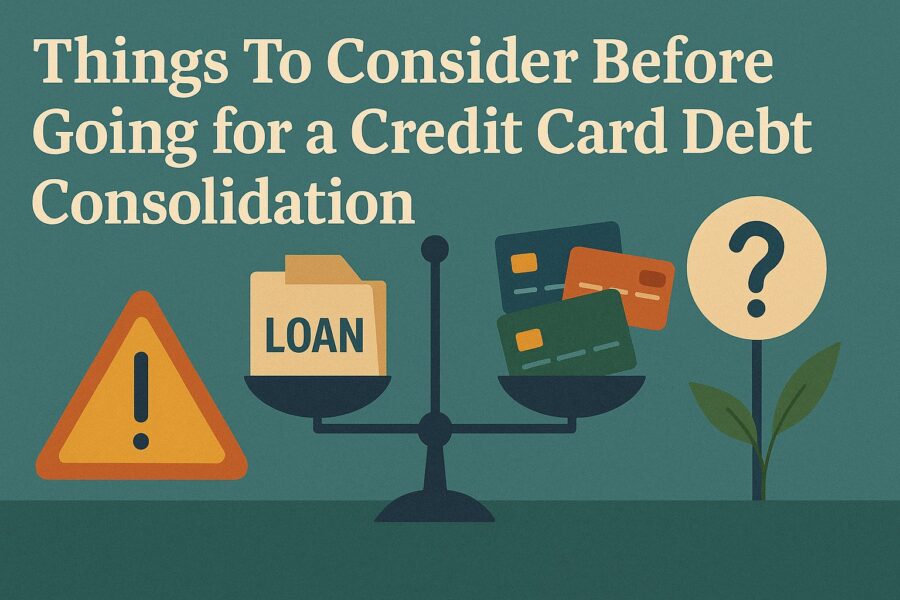
Now that you know what is a credit card debt consolidation loan, here are some factors that you must consider before consolidating your debt.
- Make a Calculative Decision: Make sure that the debt consolidation method you are trying makes you pay lower overall interest.
- Check your Credit Score: having a credit score above 700 will get you better offers for debt consolidation.
- Make a Payback Plan: Accept a loan whose tenure and monthly EMI are within payback capacity. Moreover, if you are thinking about a balance transfer credit card, make sure you can afford it.
- Consider Multiple Payback Options: Even though a personal loan is the safer option, it is a long-term commitment. Consider it only if you truly need it, as many banks charge a pre-payment fee if you try to pay back more than your fixed EMI.
💡Pay your credit card bills in an easy and secured way and experience smooth transactions with the PICE App.
Other Possible Option Beyond Debt Consolidation Loans
Credit card debt consolidation is a good option to reconsider your finances. However, you should only jump into it if you can truly pay it off. Otherwise, you are just postponing an inevitable financial crisis. Well, here are some other options you can try other than debt consolidation.
- Debt Management Plans
There are some organisations called credit counselling services that offer debt-management programs. Here, counsellors directly work with your creditors to reduce your interest rates and monthly payments as per your repayment capacity.
This program can be a viable replacement for debt consolidation via loans. However, since this is a counselling session about financial management, you will be refrained from opening new lines of credit until your debt management plan comes into action.
- Credit Card Refinancing
Credit card refinancing is a method where your existing credit card debts will be transferred into a new balance transfer credit card, with around 0% interest rates. However, the 0% rate is only temporary for a period of time. However, it is tough to get one of these cards without a high credit score.
This method allows you to gather funds within the temporary time period allowed to you in the transfer credit card. This is a great method if you are looking for support to help you get back on track.
- Debt Settlement
Debt Settlement, also known as One Time Settlement (OTS), is another way you can get rid of your financial burden. In this case, you pitch your situation to the bank and negotiate for paying less than what you owe.
Here, you work around and manage to get some funds to obtain a one-time settlement of your debts from the bank. Well, this process will severely affect your credit scores. It can also make it hard for you to get credit money for the next few years.
- Declaring bankruptcy
Filing for bankruptcy is a legal process in which debtors are unable to pay back their debts through any means. Once a debtor declares bankruptcy, the court orders that the debtor’s financial situation be reviewed. If the court finds that the person does not have enough assets to cover their debts, the court will discharge their debts legally.
However, bankruptcy must be the last thing you should consider, as it will have a severe impact on your credit score and can remain on your credit report for up to 10 years.
Debt Consolidation vs Debt Settlement
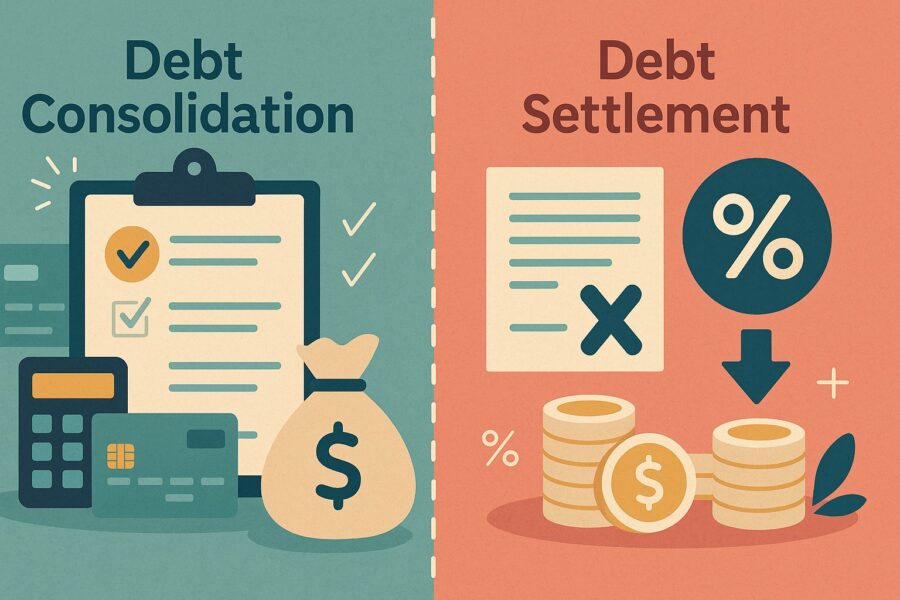
| Aspect | Debt Consolidation | Debt Settlement |
| Definition | Combining multiple debts into a single loan with one EMI to simplify repayment. | Negotiating with creditors to pay a reduced amount as a final settlement. |
| Impact on Credit Score | Minimal initial impact; can improve your score within months if EMIs are paid on time. | Significant negative impact on your credit report as debts are marked “settled.” |
| Best For | Individuals who can manage lower EMIs and want to improve financial stability without damaging their credit scores. | People in severe financial distress who cannot afford even reduced EMIs. |
| Eligibility | Requires a stable income and repayment capacity. | Chosen when repayment capacity is very low or non-existent. |
| Pro Tip | Ideal for those still in active employment or needing future credit. | It can be an option for retirees or those unlikely to need future credit, potentially saving money without harming their lifestyle. |
Conclusion
Now that you know what is a credit card debt consolidation loan and everything you should know about it, including its pros and cons and its alternatives. You can now make an informed decision on what method you should go with to improve your financial situation.
If you are going for a credit card debt consolidation via loans, you must know for a fact that you will pay off that loan without fault. Although consolidating the debts is quite common, as reports say that 39% indebted credit card holders choose to consolidate their debts.
 By
By 










